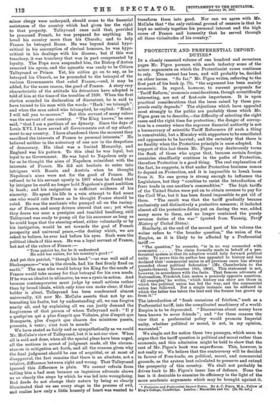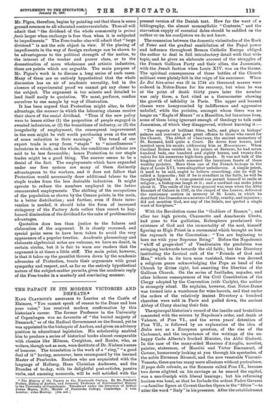PROTECTIVE AND PREFERENTIAL IMPORT- DUTIES.* IN a closely reasoned volume
of one hundred and seventeen pages Mr. Pigon pursues with much industry some of the minor arguments on which the Protectionist cause continues to rely. The contest has been, and will probably be, decided on other issues. "So far," Mr. Pigou writes, referring to the
first part of his book (p. 79), "the argument has been mainly economic. In regard, however, to current proposals for 'Tariff Reform,' economic considerations, though scientifically interesting, are not of first-rate importance. It is upon practical considerations that the issue raised by these pro- posals really depends." The objections which have appealed most strongly to the public are probably those which Mr. Pigou goes on to describe,—the difficulty of selecting the right cases and the right time for protection; the danger of corrup- tion in a country where the supreme financial authority is not a bureaucracy of scientific Tariff Reformers (if such a thing is conceivable), but a Ministry with supporters to be conciliated and opponents to be harried ; and the certainty that there is no finality when the Protective principle is once adopted. In support of this last thesis Mr. Pigon very dexterously turns the flank of those who argue that, because certain foreign countries steadfastly continue in the paths of Protection, therefore Protection is a good thing. The real explanation of the fact, he suggests, is that under Protection business comes to depend on Protection, and it is impossible to break loose from it. No one group is strong enough to influence the Legislature, but they "combine to resist the introduction of freer trade in one another's commodities." The high tariffs of the United States were put on to obtain revenue to pay for the Civil War, but it has been found impossible to get rid of them. "The result was that the tariff gradually became exclusively and distinctively a protective measure; it included almost all the protective duties put on during the war, added many more to them, and no longer contained the purely revenue duties of the war" (quoted from Taussig, Tariff History of United States).
Similarly, at the end of the second part of his volume the writer refers to "the broader question," the union of the Empire, as it is likely to be affected by a Preferential tariff :—
"The question," he remarks, "is in no way connected with economics The claim formally made in behalf of a pre- ferential system is that its adoption would help forward political unity. To prove this its anther has appealed to history and has declared that 'commercial union in all previous cases has always preceded closer political federation' (Mr. Chamberlain to the Agents-General, November 19th, 1903). This statement is not, however, in accordance with the facts. That famous advocate of Nationalism, Friedrich List, makes a precisely opposite assertion. 'All examples,' he writes, which history can show are those in which the political union has led the way, and the commercial union has followed. Not a single instance can be adduced in which the latter has taken the lead and the former has grown up from it:"
The introduction of "fresh occasions of friction," such as a Preferential tariff, into the complicated machinery of a world.
Empire is to be deprecated. "Discussions about money have been known to sever friends "; and "for these reasons the view that a preferential policy would promote Imperial unity, whether political or moral, is not, in my opinion, warranted."
We single out for notice these two passages, which seem to argue that the tariff question is political and moral rather than economic, and this admission might be held to show that the rest of Mr. Pigou's book was superfluous. This, however, is not really so. We believe that the controversy will be decided in favour of Free-trade, on political, moral, and commercial grounds, as the system best calculated to preserve and extend the prosperity of this country. We shall not probably be driven back to Mr. Pigou's inner line of defence. None the less is it desirable to examine its efficiency in the light of the more academic arguments which may be brought against it.
• Protective and Preferential Import-Thai.. By A. C. Pigott, M.A., Fellow of. /Ong's College, Cambridge. London Tasmanian end Co. (21. Cd. net.) Mr. Pigou, therefore, begins by pointing out that there is some ground common to all educated controversialists. Thus all will admit that "the dividend of the whole community is prim& fade larger when exchange is free than when it is subjected to impediments." The Free-trader also will admit that "large dividend" is not the sole object in view. If the placing of impediments in the way of foreign exchange can be shown to be advantageous to the political strength of the nation, to the interest of the weaker and poorer class, or to the domestication of more wholesome and artistic industries, these are points which are arguable. The main purpose of Mr. Pigou's work is to discuss a long series of such cases. Many of them are so entirely hypothetical that the whole discussion has an air of academic unreality, but in the absence of experimental proof we cannot get any closer to the subject. The argument is too minute and detailed to lend itself easily to quotation. We must, perforce, confine ourselves to one sample by way of illustration.
It has been argued that Protection might alter, to their advantage, the manner in which the labouring classes receive their share of the social dividend. "Thus if the new policy were to lessen either (1) the proportion of people engaged in sweated industries, or (2) the transitions of industry, or (3) the irregularity of employment, the consequent improvement in the men might be well worth purchasing even at the cost of some reduction in their earnings." The trend of our export trade is away from " staple " to " miscellaneous " industries in which, on the whole, the conditions of labour are said to be less favourable ; hence Protection to our staple trades might be a good thing. The answer seems to be a denial of the fact. The employments which have expanded under our free system are many of them distinctly advantageous to the workers, and it does not follow that Protection would necessarily draw additional labour to the staple trades from the less desirable industries. It might operate to reduce the numbers employed in the • better remunerated employments. The shifting of the occupations of the population as shown by the Census points, in the main, to a better distribution; and further, even if State inter- vention is needed, it should take the form of increased stringency of the Factory Acts rather than resort to hap- hazard diminution of the dividend for the sake of problematical advantages.
Quotation does less than justice to the fulness and elaboration of the argument. It is closely reasoned, and Special pains seem to have been taken to avoid the veiy appearance of a popular treatise. Academic phraseology and elaborate algebraical notes are welcome, we have no doubt, in certain circles, but it is fair to warn our readers that the argument is at times a little stiff. The main point, however, is that it takes up the gauntlet thrown down by the academic advocates of Protection, treats their arguments with great sympathy and respect, and, as far as the entirely hypothetical nature of the subject-matter permits, gives the academic reply of the Free-trader in a masterly and convincing manner.























































 Previous page
Previous page